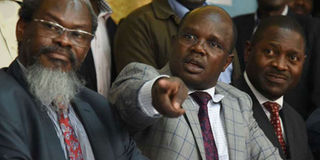Universities, ministry resume talks for lecturers' pay rise

Universities Academic Staff Union Secretary General Constantine Wasonga (centre) gestures during a news conference in Nairobi, on May 8, 2018 regarding a lecturers' strike. PHOTO | FILE | NATION MEDIA GROUP
What you need to know:
- Last year, lecturers went on strike demanding a salary increase in an industrial action that lasted 78 days.
- The ministry of education refused to enter into negotiations, saying a case by lectures over SRC job evaluation had to be resolved first.
- Chief negotiator Prof Isaac Mbeche, who is also the University of Nairobi vice-chancellor, confirmed the meeting saying it was long overdue.
Talks on pay raise for lecturers will resume on Monday after a year of court battles as the Ministry of Education and universities engage Salaries and Remuneration Commission (SRC) on negotiation beacons.
Guidelines from SRC will allow the Inter Public Universities Consultative Council Forum to initiate talks with lecturers who have been demanding salary increase, a row that led to strike lasting 78 days last year.
Chief negotiator Prof Isaac Mbeche, who is also the University of Nairobi vice-chancellor, confirmed the meeting saying it was long overdue.
“We will meet so that we can look at what has been budgeted for salary increase then engage lecturers,” said Prof Mbeche.
The National Treasury budget estimates indicate that Sh5.2 billion will be used for pay hike for 27,000 staff in public universities.
TALKS COLLAPSE
Talks had collapsed after the Universities Academic Staff Union (Uasu) took SRC to court over job evaluation report which they said had put lecturers in same ranks with non-academic staff.
Uasu Secretary-General Constantine Wasonga has been on record demanding for immediate talks with their employers on 2017-2021 collective bargaining agreement (CBA).
“Teachers have already signed their CBA. Nurses have done the same. It is only the lecturers that are remaining,” he said.
In 2019, Uasu contested the job evaluation report in court, aggrieved by placement of lecturers and non-academic staff on the same rank.
Last year, lecturers were forced to give up their 78-day strike and resume work without a salary hike after the government insisted that it could only engage them following conclusion of a case on the job evaluation.
“Now that the court has given its verdict let SRC give the beacons. They have been saying that they cannot give beacons because we are in court. Now we want the beacons so that we can negotiate on salaries,” said Dr Wasonga.




